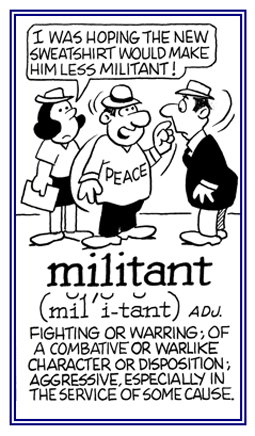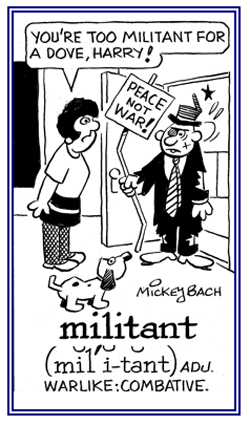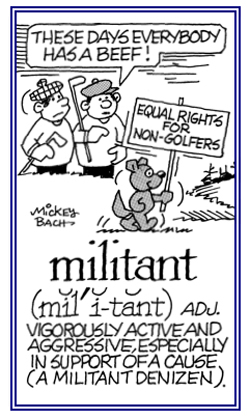milit-
(Latin: soldier, fight; soldiers of war; war, warfare)
To do away with a military organization or potential, or to prohibit; such as, a zone or frontier area, from being used for armed forces purposes.
demilitarize (verb), demilitarizes; demilitarized; demilitarizing
1. To remove or prohibit the presence of soldiers, weapons, and military installations in an area after an agreement has been made to stop military operations: In accordance between the two countries, acceptance of withdrawing all armed forces to demilitarize the region was quickly acted upon during the following months.
2. To eliminate the military character of a zone: All buildings and housing of the soldiers were removed to demilitarize the area.
3. To prohibit military forces or installations in an area: In order to demilitarize the section of the city, all bases, camps, headquarters, etc. of the armed forces were forbidden.
4. To replace military control with civilian control: To demilitarize the area, the politicians agreed on removing all armed forces and power in the area and having the city return to a normal civil life of people not connected with armed forces and services.
2. To eliminate the military character of a zone: All buildings and housing of the soldiers were removed to demilitarize the area.
3. To prohibit military forces or installations in an area: In order to demilitarize the section of the city, all bases, camps, headquarters, etc. of the armed forces were forbidden.
4. To replace military control with civilian control: To demilitarize the area, the politicians agreed on removing all armed forces and power in the area and having the city return to a normal civil life of people not connected with armed forces and services.
1. A form of entertainment that features and celebrates the military: "Militainment is a word that includes news coverage of, or television shows about war or other military themes and often involves the Department of Defense."
2. Etymology: a portmanteau, or a term that is formed by joining two other words and combining their meanings, which in this case consists of military and entertainment.
2. Etymology: a portmanteau, or a term that is formed by joining two other words and combining their meanings, which in this case consists of military and entertainment.
A condition of being aggressive or very determined about the support of a cause.
Active, determined, and often willing to use force or warfare to achieve an objective.
militant (noun), militants (pl)
1. A combative person who is aggressively active; especially, in the service of a political or social cause: "Sam was a militant supporter in his political party as shown by the amount of time and and the efforts he spent working to achieve the re-election of his candidate."
2. Etymology: from Latin militare, "to serve as a soldier"; from milit, "soldier".
2. Etymology: from Latin militare, "to serve as a soldier"; from milit, "soldier".
militant (adjective), more militant, most militant
1. Characteristic of having or showing a strong desire or willingness to use strong, and sometimes forceful methods, to achieve something or to support a cause, often to the point of being excessively aggressive: The militant protesters were breaking into government buildings and setting some of them on fire to demonstrate their objections to the corrupt officials.
2. Pertaining to being engaged in warfare: The militant soldiers responded to the rebel attacks with gunfire that resulted in some of the demonstrators being seriously injured or killed.

© ALL rights are reserved.

© ALL rights are reserved.

© ALL rights are reserved.
Go to this Word A Day Revisited Index
2. Pertaining to being engaged in warfare: The militant soldiers responded to the rebel attacks with gunfire that resulted in some of the demonstrators being seriously injured or killed.



Go to this Word A Day Revisited Index
so you can see more of Mickey Bach's cartoons.
militantly (adverb), more militantly, most militantly
A reference to being active, determined, and often willing to use force to achieve a purpose.
War objects; such as, weapons, medals, and uniforms, which are collected as a hobby or for historical reasons.
militarily (adverb), more militarily, most militarily
In a soldierly manner or position.
A political orientation of a people or a government to maintain a strong armed force and to be prepared to use it aggressively to defend or to promote national interests: "The government policy of militarism against foreign attacks involved strengthening the armed forces to defend the country."
Soldiers usually win the battles and generals get the credit for them.
1. Someone who advocates war or warlike policies.
2. A zealous supporter and promoter of the ideals of armed forces.
2. A zealous supporter and promoter of the ideals of armed forces.
militaristic (adjective), more militaristic, most militaristic
1. The act of assembling and putting into readiness for war or other emergency.
2. To equip with armed forces and defenses.
3. To adapt for military use.
2. To equip with armed forces and defenses.
3. To adapt for military use.
The grim fact is that we prepare for war like precocious giants, and for peace like retarded pygmies.
militarize (verb), militarizes; militarized; militarizing
1. To equip or train someone or group of people for war: The armed forces was militarizing, or mobilizing, the soldiers with weapons.
2. To convert something such as a piece of land or a building for soldiers to use: The vacated lot was militarized with housing for the troops.
3. To persuade somebody to support a policy of aiding and promoting the armed forces: The officer tried to militarize the group of students on the street with the principles and spirit of the army.
2. To convert something such as a piece of land or a building for soldiers to use: The vacated lot was militarized with housing for the troops.
3. To persuade somebody to support a policy of aiding and promoting the armed forces: The officer tried to militarize the group of students on the street with the principles and spirit of the army.
War is the science of destruction.
Showing page 1 out of 2 pages of 30 main-word entries or main-word-entry groups.

